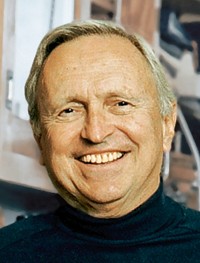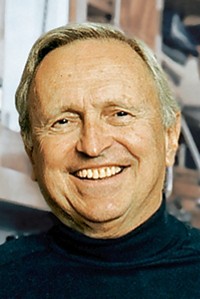Advertisement
Grab your lab coat. Let's get started
Welcome!
Welcome!
Create an account below to get 6 C&EN articles per month, receive newsletters and more - all free.
It seems this is your first time logging in online. Please enter the following information to continue.
As an ACS member you automatically get access to this site. All we need is few more details to create your reading experience.
Not you? Sign in with a different account.
Not you? Sign in with a different account.
ERROR 1
ERROR 1
ERROR 2
ERROR 2
ERROR 2
ERROR 2
ERROR 2
Password and Confirm password must match.
If you have an ACS member number, please enter it here so we can link this account to your membership. (optional)
ERROR 2
ACS values your privacy. By submitting your information, you are gaining access to C&EN and subscribing to our weekly newsletter. We use the information you provide to make your reading experience better, and we will never sell your data to third party members.
People
At Heritage Day, Honors For Chemists
Researchers and entrepreneurs celebrated at Chemical Heritage Foundation's annual event
by Pamela Zurer
June 26, 2006
| A version of this story appeared in
Volume 84, Issue 26

For a decade now, the Chemical Heritage Foundation has honored chemists and chemistry at its annual celebration of Heritage Day. Last month's festivities in Philadelphia paid tribute to four individuals whose "perseverance, creativity, and vision have transformed our world," said CHF President Arnold Thackray.
Ronald Breslow, Samuel Latham Mitchill Professor of Chemistry and University Professor at Columbia University, was awarded CHF's Othmer Gold Medal. Chemistry Nobel Laureate Roald Hoffmann, Frank T. Rhodes Professor of Humane Letters at Cornell University, was honored with the American Institute of Chemists (AIC) Gold Medal. Sol J. Barer, founder and chief executive officer of Celgene, received the Chemists' Club's Winthrop-Sears Award. And Richard J. Bolte Sr., founder and chairman of BDP International, received CHF's newly established Award for Supporting Industries.
Breslow is a "truly multifaceted individual, a brilliant chemist with deep theoretical and experimental insight," Thackray said. The Othmer Gold Medal recognizes Breslow's pioneering research in nonbenzenoid aromatic chemistry, biomimetic systems, and anticancer therapies, Thackray continued, as well as his strong voice for the chemical sciences. As Nobel Laureate Robert H. Grubbs noted when he introduced Breslow, his Ph.D. research adviser, Breslow is an exemplary teacher and mentor who has trained a generation of physical organic and bioorganic chemists.
In accepting the award, Breslow attributed his success to having married a distinguished biochemist: his wife, Esther. A professor of biochemistry at Cornell University's medical school, Esther Breslow has been an invaluable collaborator, teacher, and sounding board, he said. The couple will celebrate their 50th anniversary this year.
What makes chemistry special, according to Breslow, is the extension of nature it allows. "We chemists take a look at what nature has handed us and extend it," he said. "We don't just try to understand what the world is but try to create a new chemical universe."
The fun of being an academic, Breslow said, includes becoming partners in exploring the world with people like Grubbs. Breslow's first teaching obligation at Columbia, he noted, was a seminar for seniors, including a young Hoffmann, who was looking into Huckel molecular orbital theory.
Hoffmann's continued exploration of theories of chemical reactions led to the Nobel Prize in Chemistry in 1981. The AIC Gold Medal acknowledges, in addition to his research accomplishments, his "impact in opening the eyes of nonscientists to the connections between their world and chemistry and other sciences," according to AIC President Lawrence Duffy.
In his acceptance address, Hoffmann examined the meaning and use of theory. "I want to define theory just as good thinking in general," he said, "the combination of words, equations, and logic that one must weave around facts that are inherently mute."
People accept a theory, he said, if it explains more things or explains them better than other theories. "One reason people buy theories is because they are aesthetically pleasing, but that is dangerous," he said. "We fall for simple molecules, simple equations, simple mechanisms. But simplicity lies behind stereotyping and prejudice. Is nature ever symmetrical? Beauty lies at some tense edge where simplicity and complexity, order and chaos, compete."
The Winthrop-Sears Award recognizes individuals whose entrepreneurial actions have contributed to the chemical industry and helped society. Barer, this year's recipient, was honored for his leadership at Celgene, the biotechnology company whose story is inextricably interwoven with that of thalidomide. That drug, responsible for hundreds of birth defects in Europe five decades ago, is now being sold by Celgene under strict controls as an anti-inflammatory treatment and for certain cancers. An analog developed at Celgene, Revlamid, has had "almost unheard of rates of response" in the clinic, Barer said, and is only the first compound in a series.
"I obviously strongly believe in the role of research," Barer said. "At the end of the day, it is the fruits of this endeavor that create value for our company. And the value we create is inherent in the benefits that patients get. Without these benefits to patients, Celgene, as a company, is irrelevant."
Another risk-taking entrepreneur, Bolte, became the first recipient of CHF's new Award for Supporting Industries. Bolte's company, BDP International, is a leader in the global shipping business, and Bolte himself was a leader in using information technology to organize the movement of freight internationally. Bolte was unable to attend Heritage Day, but his son, Richard Bolte Jr., CEO of BDP, represented him at the award ceremony.
"We use state-of-the-art technology and have become process experts in areas our clients didn't want to handle: the global order management process," Bolte Jr. said. "You'd be surprised what firms like us can do. My father was handed quite a challenge when he founded the company, which he met through his tenacity, vision, and courage."




Join the conversation
Contact the reporter
Submit a Letter to the Editor for publication
Engage with us on Twitter